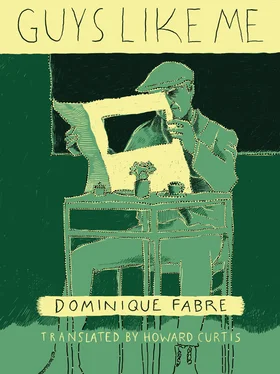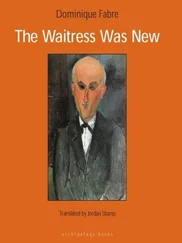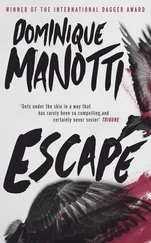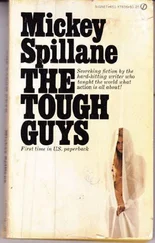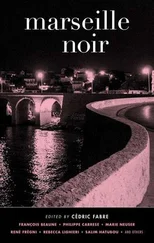“They made things properly in those days.”
He said it as if it was a joke, and I had to smile again. He looked less weary than usual. He seemed happy to be leaving, I think.
“How about you? How are you?”
I’m fine, life’s the same as usual. What could I really talk to him about? Marie? Of course not. He was one of those guys you can’t imagine living for a long time with a woman, but who was I to think that of him? I told him that my son had gone away for six months for his work …
“Your son, oh, yes, what’s his name again?”
“Benjamin.”
He nodded, with a big smile. He remembered the christening well, at Sainte Odile, near the Porte de Champerret. I haven’t seen him since, he added. Does he look like you? Then, having shot his arrow, he put his almost spent cigarette back in the corner of his mouth without waiting for my answer.
“Could you help me, please?”
By the time Marco arrived, we were taking out plastic bags filled with garbage, things to throw away, unusable things he’d amassed in this apartment. He’d always re-cycled, even when he wasn’t obliged to. You surrounded yourself with tons of things without knowing, and it was always the same, with each move you had a big spring cleaning. Marc-André waved to us and took out his cell phone, he had an important call to make. We finished transporting what he had to throw away into the courtyard of the building. The kids opposite were looking at us, kneeling on the couch, the TV set on behind them, although they weren’t looking at it. We could also hear the noise of the boulevard in La Garenne-Colombes where we used to walk together, all those years ago. It was still us, it wasn’t really our home any more. Marc-André was standing in the doorway of the inner courtyard.
“Hi, how are you? Why don’t you have the light on?”
We shook hands. “Fine, and you?”
“Not bad. One more day gone. Right, shall we go?”
He hadn’t had time to give it any thought, and Jean didn’t know the local restaurants. Maybe we could take the car and go to the big pizzeria in Clichy? It wasn’t far from Beaujon, on the way back I could go there and look at the windows on her floor. Was I more superstitious than before? What were we really afraid of, time rushing by and taking us to our end? Marc-André was looking around.
“So, this time it’s true, you’re really going for good?”
“Yes, this time I’ve had enough, I’m leaving.”
He smiled as if admitting defeat. And yet it seems to me something was driving him and it wasn’t his failure, on the contrary, it was a desire to leave, a desire to be somewhere else, that was stronger than him. Somewhere else?
“I think it’s better this way. And besides, my mother’s eighty-two, I want to take advantage of the time she still has, you know.”
Marco looked tense. Several times lately, he’d told me he was fed up with his success. He was too tired to want any more of it. But he spoke about it with Aïcha, and then everything became possible again, because he was no longer alone in this life. You had to accept that there was a price to pay. Guys like him didn’t get anything for nothing, when it came down to it, that was the case with most of us. I got in the back seat of Marc-André’s car.
There were two red lights in succession, and we didn’t say anything, all the time we sat there waiting. Guys with their windows down, their radios on or their cell phones in their hands, waiting for the lights to change. He held himself very straight, at one moment our eyes met in the rearview mirror. Marco turned to me.
“I’m fed up with these hold-ups. By the way, what about your scooter, do you have it?”
“Soon, yes.”
Jean turned to me. “Don’t you already have a car?”
He smiled vaguely, as he often did. When we got to Clichy, a car was just pulling out and we didn’t have to drive around looking for a parking space. Marco got out first, he switched off his cell phone. That way I can have a little peace and quiet. I’ve had a rough day. We sat down in the smoking area. The place had been refurbished two years ago and, in addition to the music, which was a little too loud, the lighting was also too harsh in the middle of the room. We sat down in a corner at the far end. Jean had brought his case with him. When they took our orders and served the aperitif, he told us he wanted to show us some photographs, to see if they reminded us of things. I thought that was weird, Marco was as surprised as I was. He’d kept everything. It was still in his case, he had never let it out of his sight. He’d stuck some of them in a school notebook, along with the dates, sometimes followed by a question mark. The oldest dated from 1976. The three of us were twenty, barely more than children. I recognized some of them, class photographs I must have somewhere at home, then he showed us others in which we didn’t appear.
Several photographs in the courtyard of the building where he lived with his mother. He had the same eyes as her, the same way of looking with a slight lift of the head, the way people look under their glasses, except that he didn’t wear glasses. Photos also of him when he was very small, that was my father, he said, pointing to a middle-aged man, who really seemed to be from another time, very distant even in the 1970s, and even further from us today. And then lots of photographs taken in Asnières, at the Bar des Trois Communes, where we sometimes went, and at Nazim’s in Bois-Colombes, the one who had died only two months ago and had had a good life. We really had lived it up. We gradually relaxed. We even pushed away our plates, there was a kind of fire still burning in all this that went beyond our common memories. When the waitress brought us our meals, we left his photographs to one side. We told each other about long-gone things. There were our teachers and our parents. The injustices never swallowed, the hopes never followed by results. Then there were the stories about girls, love affairs we’d never forgotten. We realized we’d pretty much known the same girls in high school, and at Le Cercle near the station, we spent a whole lot of time there, and when we were alone, up until the early ’80s, that was where we went. Generally, you didn’t have to wait too long.
He was getting excited as he spoke, our memories were gradually falling into place, just like that, for no reason, he was putting our past together. We ordered a good bottle of red wine, we had to celebrate this, in the end it had been a good idea of his to make us revisit our lives. There weren’t so many of us left now. We’d lost touch. And then almost nobody lived in our old neighborhood in the Hauts-de-Seine anymore. He had other photographs in a small brown envelope. Several times, he seemed hesitant to show them to us.
“Here, I have this too, if you want. I’ll be back.”
He went to the toilets. Marco watched him walk away and shook his head.
“Are you thinking the same as me? I’m surprised he held out all this time.”
I opened the envelope. It was her, the girl he’d been harping on about all this time. Adeline Vlasquez. She was wearing a long flowered skirt on platform B of the station at Asnières, and in the sunlight the colors looked a little fake. They were already old, these photographs. In this one, he had long hair, he was wearing a shirt with a large collar, he had his arm around her shoulders and they seemed to be in love. Who’d taken the picture? Do you remember this girl? I had only a vague image of this Adeline Vlasquez.
“He’s in a bad way, though, I wonder how he’s going to pull through this time.”
I put the photos back in the envelope. He came back toward us with a big smile.
“Did you look at them?”
“Yes,” we said. “They’re great. That was quite a time. Do you still hear from her?”
Читать дальше
